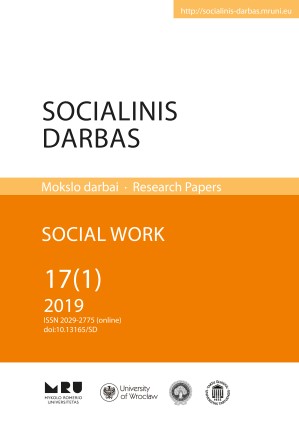ARTIMŲJŲ, GLOBOJANČIŲ ŠIZOFRENIJA SERGANČIUS ASMENIS, PATIRTIS TENKINANT PAGALBOS POREIKĮ
EXPERENCE OF RELATIVES IN THE GUARDIANSHIP OF PERSONS WITH SCHIZOPHRENIA MEETING THE NEED FOR ASSISTANCE
Author(s): Alina Petrauskienė, Vilma KudarauskienėSubject(s): Psychology
Published by: Mykolas Romeris University
Keywords: guardianship of the person with Schizophrenia; experience of relatives; assistant contacts in close family environment and institutional setting;
Summary/Abstract: The research presented in this article aims to highlight the experience of relatives in the guardianship of persons with Schizophrenia in meeting the need for assistance. It is recognized that the guardianship and responsibility of persons with Schizophrenia should be shared between relatives, health care and social services and the society. So, the ongoing deinstitutionalization in Lithuania should provide more available assistance for community – based opportunities for people with Schizophrenia and their relatives, reducing the burden of guardianship. Object of the research: experience of relatives (feelings, evaluation, attitudes and expectations). Research questions: What does it mean for relatives of persons with Schizophrenia to use the assistance of others in a close family environment and institutional setting? What encourages and restricts relatives when seeking assistance? A qualitative interpretation research was chosen. The research included 7 participants – women providing guardianship for persons with Schizophrenia. Semi – structured interviews were carried out. Qualitative content analysis was performed by analyzing the interview text for answers to research questions. The given texts were red attentively, interpreted, insights and findings of others scientists closely related to research topic were provided. The following conclusions have been formulated: the experience of the relatives involved in the research regarding formal and informal assistance providers is multifaceted, dynamic, depends on the individual guardian’s attitudes, circumstances and changes in the development of the care of the sick person. Accepting assistance from community – based day centers for relatives means getting the benefits and valuable help: improved guardian well – being, better quality of life and more opportunities for socialization. Guardians apply for institutional (residential) help in critical Schizophrenia guardianship situations: the deterioration of a person’s mental health, relapse of the disease, feeling tired exhaustion, recognition of respite from permanent long – term guardianship. The availability service of community day centers in Lithuania has been noticed, but the availability of residential (nursing / guardianship) service and professional consulting remains complicated. The relatives face challenges related to the bureaucracy of social and health care services providers, lack of understanding and refusal of the staff, lack of cooperation and information. This reduces relatives’ motivation to seek assistance and undermines the search for alternatives to help. Familiarizing oneself with the availability of assistance in a near – family environment strengthens the daily burden of guardianship. Assistance of close relatives, friends for the guardians means less dependence on the guardianship of the person with Schizophrenia, the ability to rest, engage in the desired activity and take care of their needs or hobbies. Then there is peace, a sense of security and a joy of life. However, referral to relatives, friends means the inner efforts of the guardians to “climb over themselves”, overcome their fears and shyness to express their needs to others.
Journal: Socialinis darbas
- Issue Year: 17/2019
- Issue No: 1
- Page Range: 6-20
- Page Count: 15
- Language: Lithuanian

